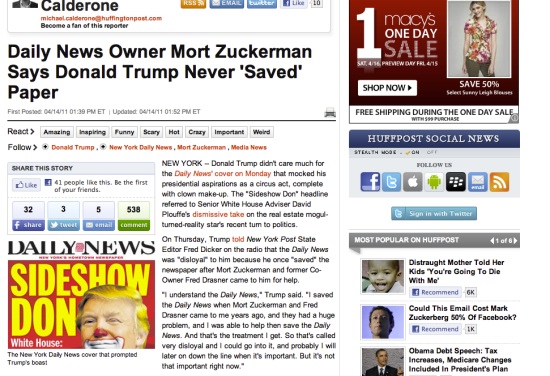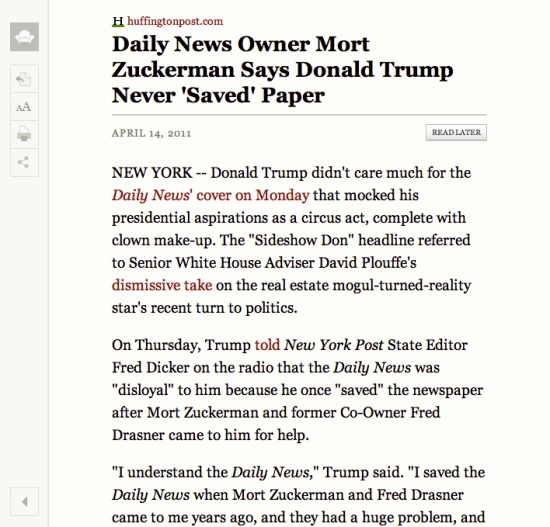Why New Link Shortener Rdd.me Stands Out
Design firm Arc90’s new rdd.me link-shortening service tackles two seemingly unrelated problems at once. The first is making long URLs short. (Not that there is any shortage of services for doing that.)
The second problem rdd.me solves is the one identified by legendary magazine designer Roger Black, who recently opined that “Most Web pages are like third-world soccer stadiums.” By which he meant, they’re covered with ads and other distractions.
Arc90’s Readability service has been de-soccer-stadium-ing the Web for two years now, allowing browsers a one-click solution for transforming this:

Into this:


Link shortening service rdd.me simply combines these two functions. Let’s say you use it to shorten a link for Twitter. Anyone who clicks on that link from a conventional Web browser will be directed to the site in question, and a bar at the top of the screen offers them the option to Readability-ize the site. It’s a polite way to evangelize for Readability, which is the sort of thing people who believe in a less-cluttered Web do.
On a mobile device, the service functions differently. Anyone clicking on that link in Twitter from, say, a smart phone, will be directed to the Readability-ized version of the page, automatically. This saves your viewers from ending up on a page they can’t read because it’s too crowded, and the text is too tiny; it also speeds load times.
But this function of the service could prove to be controversial. In an interview, Arc90 founder Rich Ziade said that the people behind Readability are committed to making sure publishers still get their pageviews. However, the different behavior of rdd.me in a mobile browser means those publishers won’t get their pageviews when users are coming from mobile devices. In essence, rdd.me assumes that most publishers aren’t competent enough to detect mobile browsers and direct users to a page that will give them a satisfying mobile reading experience.
Whether or not publishers are happy with that state of affairs may be irrelevant: the Readability bookmark already works fine on mobile browsers, and Ziade reports that the service is wildly popular, with “millions” of unique articles a month passing through the service.
“I think what it comes down to is there is a really strong need here,” says Ziade. “Tools like this wouldn’t be this popular if [Readability] didn’t resonate with people – if [the current state of the Web] didn’t affect people to they point that they thought this was needed.”
Keep Reading
Most Popular
Large language models can do jaw-dropping things. But nobody knows exactly why.
And that's a problem. Figuring it out is one of the biggest scientific puzzles of our time and a crucial step towards controlling more powerful future models.
How scientists traced a mysterious covid case back to six toilets
When wastewater surveillance turns into a hunt for a single infected individual, the ethics get tricky.
The problem with plug-in hybrids? Their drivers.
Plug-in hybrids are often sold as a transition to EVs, but new data from Europe shows we’re still underestimating the emissions they produce.
Stay connected
Get the latest updates from
MIT Technology Review
Discover special offers, top stories, upcoming events, and more.